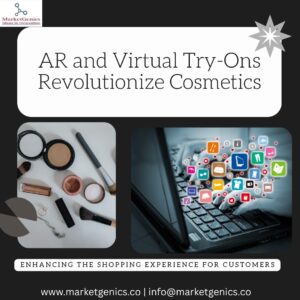Impact of Augmented Reality (AR) and Virtual Try-Ons on Online Cosmetic Sales
Introduction
The beauty industry has undergone a technological transformation in recent years, with Augmented Reality (AR) and Virtual Try-On (VTO) solutions redefining how consumers shop for cosmetics online. Loyalty or the brand is no longer limited to a physical market as they can give distinct, tailormade experiences through applications and websites. MarketGenics is going to analyze the industry in details. With the gradual growth in popularity of customised beauty products, AR has enabled users to test different shades of foundation, eyeliners, hues in lipstick or even hair color thereby giving a consumer experience that is a combination of the offline and online purchasing forms.
As stated by MarketGenics, the worldwide Augmented Reality (AR) in the beauty and cosmetics industry had a value of approximately USD 3.1 billion in 2024 and looks to expand by nearly 19.8% CAGR from 2025 to 2030, overcoming hurdles with newer AI-driven personalization techniques and computer vision technology.
Challenges Faced by Cosmetic Brands
While AR and VTO technology is transforming online cosmetic sales, brands face specific manufacturing and operational challenges that can be addressed through market research:
1 Digital Shade Accuracy
- Challenge: Difficult to ensure that AR-represented makeup shades match the actual product across different devices and lighting conditions.
- Solution by MarketGenics: Conducts colour calibration research across device types to guarantee shade accuracy and minimize product returns.
2 Compatibility Problems with QoE Hardware
- Challenge: AR experiences may lag or fail on older or region-specific devices, impacting consumer engagement.
- Solution by MarketGenics: Provides device usage analysis by region, helping brands optimize AR technology for key markets.
3 Regulatory Compliance Data Privacy
- Challenge: Managing user data collected through AR features while meeting evolving privacy laws.
- Solution by MarketGenics: Tracks regional privacy regulations and offers guidance to manufacturers on compliant AR feature integration.
4 ROI Uncertainty for AR Technology Investment
- Challenge: Manufacturers often lack clarity on whether investing in AR features will deliver profitable returns.
- Solution by MarketGenics: Conducts market feasibility studies and consumer adoption analytics to forecast ROI accurately before investment.
5 Chain Projections and Planning of Production
- Challenge: Sudden spikes in demand due to viral AR try-ons can disrupt production schedules and inventory planning.
- Solution by MarketGenics: Uses real-time predictive analytics based on AR usage to align production, prevent stockouts, and avoid overproduction.
6 Integration to the manufacturing process
Challenge: Difficulty incorporating AR-driven product feedback into R&D and production cycles.
- Solution by MarketGenics: Provides consumer trend analysis to align R&D decisions with virtual try-on behaviour and preferences.
MarketGenics provides a data-driven approach to assist manufacturers to overcome technical, regulatory, and operational obstacles in implementing AR to achieve efficiency, compliance, and profitability.
Real-World Impact: Case Studies
Luxury Beauty Brands
According to MarketGenics, leading luxury cosmetic brands integrating AR solutions reported a 40% boost in online sales conversion rates within the first 6 months of adoption.
Emerging Brands and Startups
Smaller, direct-to-consumer (D2C) cosmetic brands have leveraged AR features to increase customer engagement by 3X compared to conventional product pages.
What Lies Ahead of AR in Cosmetics
- AI Integration: Future virtual try-ons will integrate AI to offer personalized product recommendations based on facial features, mood, or environmental conditions.
- Virtual Makeup Artists: AI-driven AR will function as a personal beauty assistant, providing real-time tutorials alongside try-ons.
- Metaverse Shopping: Cosmetic brands are experimenting with virtual flagship stores in the metaverse, offering immersive brand experiences combined with AR-powered trials.
Conclusion
AR and virtual trial on are no longer gimmicky functions, but part of the fundamental design of online beauty retail. These cutting-edge technologies have revolutionised the consumer expectations and increased sales volumes by providing I’m keyword times, personalised and inclusive shopping experiences to consumers.
MarketGenics offers detailed market research and consumer data to assist cosmetic companies to streamline their strategies according to the emerging trends and consumer behaviour resulting in their businesses expanding at alarming rates.
